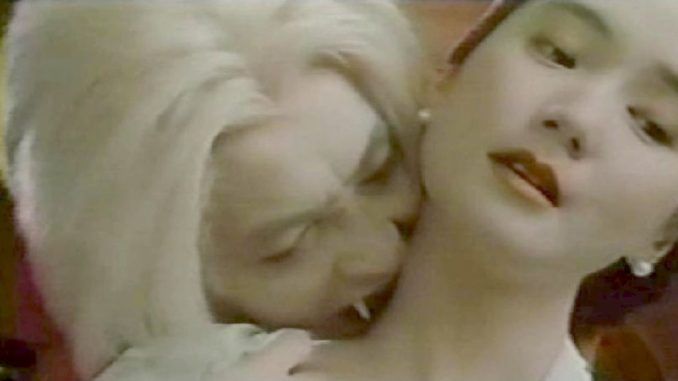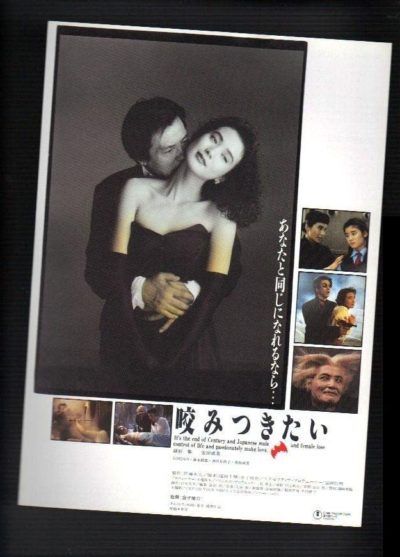
Rating: C
Dir: Shûsuke Kaneko
Star: Ken Ogata, Hikari Ishida, Narumi Yasuda, Hideko Yoshida
Even as the opening credits rolled, I was suffering severe nostalgic flashbacks. For I saw “Subtitles by Video Search of Miami”, and immediately vanished down an Internet rabbit-hole. VSoM were a grey-market – ok, they were basically pirates, despite claims they weren’t under the Berne Convention – video company, who became perhaps the best known source in the area of obscure and cult movies. They didn’t just copy movies, but also did their own translation and subtitling, and were often the only way to get a movie in an intelligible format. I never actually ordered from them myself – high costs and the danger of Custom seizure made it too risky for me in the UK. But I was familiar with their product through the tape-trading community. Though adding a generation or two to their notoriously flaky quality left films looking like pastel abstract art.
Weirdly, there’s little trace of them on the Internet. Their website is gone and what’s left is mostly mentions of them in forums and in reviews. I did find this interview with founder Tom Weissner, saying he sold VSoM in 1998; it seems to have ceased operating in the early 2010’s. Perhaps Tom saw the writing on the well, with the rise of niche DVD release companies and torrent sites, which mean that it’s now relatively easy to find many titles with a few clicks on the Internet. While I kinda miss the camaraderie of tape-trading, it’s unarguably easier now, though VSoM will never die, for as long as their product circulates. Even over 30 years later, My Soul Is Slashed still has not received an official subtitled release, which is how I found myself seeing their name on a downloaded copy of the film.
 Given this lack of a translated edition, I suspect it’s quite possible the name is a wholesale invention of VSoM. According to the IMDb, the Japanese name of the movie is 咬みつきたい , which Google Translate informs me means “I want to bite” in English. However, the IMDb also lists “From Dracula with Love”, saying that’s the “Japan, English title”. Neither mention souls or slashing. The title by which it’s best known in the West, appears to stem from the film’s use of a song with that title over the end credits, by Canadian chanteuse Mylene Farmer. It’s not inappropriate, to be sure, as this definitely tends towards the more angsty end of the vampire genre, though it falls well short of going full Twilight on us.
Given this lack of a translated edition, I suspect it’s quite possible the name is a wholesale invention of VSoM. According to the IMDb, the Japanese name of the movie is 咬みつきたい , which Google Translate informs me means “I want to bite” in English. However, the IMDb also lists “From Dracula with Love”, saying that’s the “Japan, English title”. Neither mention souls or slashing. The title by which it’s best known in the West, appears to stem from the film’s use of a song with that title over the end credits, by Canadian chanteuse Mylene Farmer. It’s not inappropriate, to be sure, as this definitely tends towards the more angsty end of the vampire genre, though it falls well short of going full Twilight on us.
It begins with a news report about the blood of Dracula, which has been rattling around Romania for the centuries since his death, ending up in the hands of dictator Nicolae Ceausescu (whose surname is mangled horribly by VSoM’s subtitles as “Khatsecu”!). Subsequent to his fall from power, the blood is smuggled out of the country to Japan, where it ends up in the hands of vampire researcher Yuzuko (Yasuda). Pausing in her investigation, she stores it in cold-storage at the hospital where she does her research, only for it to get mixed in with regular type-O blood, and administered to Ishikawa (Ogata). He’s a medical company executive who was the victim of a hit-and-run. [Worth noting, the blood seems “self aware” and appears to have brought about the mixing itself]
Ishikawa dies from his injuries, although Yuzuko convinces his teenage daughter Saeko (Ishida), to spill some of her own blood on her father’s ashes. A year later, this brings Ishikawa back, as a vampire. He’s at first entirely oblivious, not just to his status, but even that 12 months have passed. Fortunately, Yuzuko is there to educate him, along with Saeko, though his wife Kimi (Yoshida) has largely moved on and is dating the owner of the restaurant where she works. Ishikawa initially tries to convince Yuzuko to turn him back human, before realizing his new powers can be used to take revenge on those responsible for his death. For that accident was no accident. It was staged by someone in his company, to help cover up a looming scandal, for which the “late” Ishikawa could be blamed. His return is thus a bit awkward for the perpetrator.
 The approach is gentle in the main, with a light tone particularly around Ishikawa coming to terms with his new powers, limitations and general lifestyle as a vampire. There are some nice touches here, such as the “taste test” where we find out that blood has a different flavour, depending on its source. There’s a touching loyalty to his daughter, which may be a reflection of Ishikawa’s guilt at not paying her enough attention when he had a pulse. This is at awkward odds with the subplot of his wife’s new love interest, which is so bland as to be forgettable, and might as well have been excised entirely. Ideally, in favour of his steps towards vengeance against his former co-workers, which would have benefited from some additional development. His powers are kinda impressive, including full-on telekinesis; on the other hand, crosses fling him violently backward across the room, though sunlight only makes him age.
The approach is gentle in the main, with a light tone particularly around Ishikawa coming to terms with his new powers, limitations and general lifestyle as a vampire. There are some nice touches here, such as the “taste test” where we find out that blood has a different flavour, depending on its source. There’s a touching loyalty to his daughter, which may be a reflection of Ishikawa’s guilt at not paying her enough attention when he had a pulse. This is at awkward odds with the subplot of his wife’s new love interest, which is so bland as to be forgettable, and might as well have been excised entirely. Ideally, in favour of his steps towards vengeance against his former co-workers, which would have benefited from some additional development. His powers are kinda impressive, including full-on telekinesis; on the other hand, crosses fling him violently backward across the room, though sunlight only makes him age.
Eventually, Ishikawa abandons his attempts to return to life, and effectively becomes Dracula (as shown at the top) – all blonde ‘n’ stuff – to confront the man responsible, who now runs the company. He does so during a televised press conference, which causes much confusion, since vampires don’t show up on television cameras any more than they do in mirrors. It’s another example of how the script here is very good at coming up with interesting tweaks to vampire lore, yet struggles to do anything more than lightly amusing with them. Ogata provides a likable performance at the film’s core, and it never tips over into excessive sentimentality, as it could potentially have done. On the other hand, there’s a sense of potential left unexplored, and it’s too light and fluffy to be more than a brief amuse-bouche. Its obscurity makes a bit more sense now.
This review is part of our October 2023 feature, 31 Days of Vampires.
